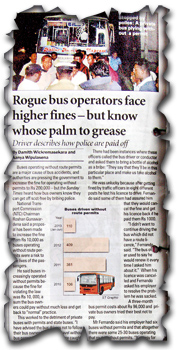News
Highway bribery
Two policemen on duty at Mundalama in the Puttalam district stopped a luxury bus heading to Point Pedro from Colombo. The bus did not have a valid route permit. The two policemen demanded from the conductor that they be paid Rs. 300 each to avoid being taken to courts.

What the policemen did not know was that the conductor was a police decoy deployed to arrest bribe-taking policemen. The operation was part of a fresh effort by Police Chief N.K. Ilangakoon to clean up the image of the police force. He has appointed a special team for the task.
The arrest of the two policemen came in the wake of a recent exposure in the Sunday Times that policemen were taking bribes from drivers and conductors of buses plying without valid permits.
On the same day in the same district, another police team from the IGP’s special unit arrested a conductor of a Jaffna-Colombo bus plying without a route permit for allegedly trying to pay a bribe of Rs. 250 to the police officers. The arrest took place at Tabbowa in Kaluwaragaswewa.
The two policemen and the conductor were produced before Colombo’s Chief Magistrate. The police on Tuesday arrested the driver of the bus and charged him with inciting the conductor to bribe the policemen. All four were released on bail. Police media spokesman Buddika Siriwardena told the Sunday Times that the IGP’s special team was set up following complaints about bribe-taking policemen on highways. He said the special unit has been tasked with arresting bribe givers — drivers and conductors — and bribe takers — policemen, who tarnish the image of the Police Department.
Superintendent Siriwardena said the unit would intensify its operations in the coming days while the Police Department had also set up a help desk to entertain complaints regarding bribe-taking policemen. The spokesman said there was much room for bribery and corruption because many private passenger buses plied without a valid route permit.
Another factor that is encouraging bribery and corruption is the high price of the route permit. A semi-luxury bus will have to pay as much as Rs. 700,000 a year for a permit to ply on the Jaffna-Colombo route and a luxury bus Rs. 1.1 million. Besides, route permits are issued on a tender basis, which, they said, reeked with corruption.
Bus owners say drivers get away by paying a bribe not only because they do not possess a valid route permit. They also pay a bribe when they are booked for violating traffic laws. Anjana Priyanjith, President of the All Ceylon Private Bus Owners’ Association, said the most common traffic offence for which the drivers are caught is what is known among the bus drivers and traffic police officers as “out of halt” offence or stopping at places where there is no bus halt to pick up or drop passengers. Since the Motor Traffic Act does not mention a specific spot fine for this offence, the errant drivers are usually produced in courts.
“Bus drivers do not like to go through the long court procedures. So they try to get away by paying little something to the police officers,” he said. Mr. Priyanjith said he was of the view that route permits were important to regulate the service. But since the process of obtaining the permit was cumbersome and expensive, many buses ply, especially on the Jaffna-Colombo route, without a permit. The Jaffna-Colombo semi-luxury route permit costs Rs.700, 000. It cost earlier Rs. 3,000. Bus owners cannot pay this big amount.
He called upon the authorities to scrap the tender system and introduce a more transparent method and bring down the cost of the permit. Lanka Private Bus Owners’ Association President Gemunu Wijeratne said bribe giving had become part of the private bus operation because the law was not being implemented effectively by the police.
Northern Province Private Bus Owners President P. Gengatharan said many bus owners applied for a Colombo-Jaffna route permit, but only a few received it. “Some of the bus owners receive their permits by using influence, but many bus owners are struggling to get one, even though they are ready to pay the high price,” he said.
Meanwhile, the civil rights group Janasandanaya, which works towards bringing about discipline in the police force, said people paid bribes because they were scared of the judicial process. Its secretary Chithral Perera said bribery on highways was an act that took place with mutual consent between police and bus drivers.
“Motorists tend to pay a bribe since the fines are high. Drivers usually say that they get over the burden by paying the bribe which is usually half the amount of the fine,” he said. Mr. Perera said that not all police officers were corrupt. But some police officers invented offences and booked motorists because they had been given targets.
He also said that he agreed that running a bus without a route permit was an offence but detecting the offence was not only the duty of the police but also of other authorities tasked with regulating the transport service. “Bus owners are mostly politicians or well-connected people. Therefore they use their influence or pay a bribe whenever they get caught for violating traffic laws,” Mr. Perera said adding that the Police Department should take tough disciplinary action against errant officers.
Commenting on the special unit set up by the IGP to crack down on bribery on the highways, Mr. Perera said, “You don’t need a special unit to stop this, if the police can properly implement the laws and follow discipline.”
According to police statistics, 110 cases have been filed against bus owners in the first six months of this year for operating their buses without route permits. Some 381 cases were filed in 2011 and 106 in 2010.
Follow @timesonlinelk
comments powered by Disqus

